- Home
- Philip Roth
Reading Myself and Others
Reading Myself and Others Read online
The author and publisher have provided this e-book to you for your personal use only. You may not make this e-book publicly available in any way. Copyright infringement is against the law. If you believe the copy of this e-book you are reading infringes on the author’s copyright, please notify the publisher at: us.macmillanusa.com/piracy.
Contents
Title Page
Copyright Notice
Dedication
Acknowledgments
Author’s Note
One
Writing and the Powers That Be
On Portnoy’s Complaint
Document Dated July 27, 1969
In Response to Those Who Have Asked Me: “How Did You Come to Write That Book, Anyway?”
On Our Gang
The President Addresses the Nation
On The Breast
On The Great American Novel
On My Life as a Man
After Eight Books
Two
Writing American Fiction
Some New Jewish Stereotypes
Writing About Jews
The Story of Three Stories
The Newark Public Library
My Baseball Years
Cambodia: A Modest Proposal
Our Castle
Imagining the Erotic: Three Introductions
1. Alan Lelchuk
2. Milan Kundera
3. Fredrica Wagman
Imagining Jews
“I Always Wanted You to Admire My Fasting”; or, Looking at Kafka
Books by Philip Roth
About the Author
Copyright
To Saul Bellow, the “other” I have read from the beginning with the deepest pleasure and admiration
Acknowledgments
All but one of the pieces in this book originally appeared in the publications cited below; some were published under other titles and in slightly different form. The author is grateful for permission to reprint.
“Writing and the Powers That Be,” La Trappola e la Nudità: Lo Scrittore e il Potere, edited by Walter Mauro and Elena Clementelli (Rizzoli, 1974); in English, in The American Poetry Review, July/August 1974.
“On Portnoy’s Complaint,” The New York Times Book Review, February 23, 1969.
“How Did You Come to Write That Book, Anyway?” The American Poetry Review, July/August 1974.
“On Our Gang,” The Atlantic Monthly, December 1971; reprinted as an afterword to the “Watergate Edition” of Our Gang (Bantam Books, 1973).
“The President Addresses the Nation,” The New York Review of Books, June 14, 1973; also included, somewhat abridged, as a skit in Watergate Capers, a satirical review performed in repertory at the Yale Drama School in November and December 1973.
“On The Breast,” The New York Review of Books, October 19, 1972.
“On The Great American Novel,” Partisan Review, No. 3, 1973.
“On My Life as a Man,” The Literary Guild, June 1974.
“After Eight Books,” The Ontario Review, No. 1, Fall 1974.
“Writing American Fiction,” Commentary, March 1961.
“Some New Jewish Stereotypes,” American Judaism, Winter 1961.
“Writing About Jews,” Commentary, December 1963.
“The Story of Three Stories,” The New York Times, October 24, 1971.
“The Newark Public Library,” The New York Times, March 1, 1969.
“My Baseball Years,” The New York Times, April 2, 1973.
“Cambodia: A Modest Proposal,” Look, October 6, 1970.
“Our Castle,” The Village Voice, September 19, 1974.
“Alan Lelchuk,” Esquire, October 1972.
“Milan Kundera,” portions in Esquire, March 1974, and in The American Poetry Review, March/April 1974; in its entirety it served as the introduction to Laughable Loves (Knopf, 1974).
“Fredrica Wagman,” introduction to Playing House, ou les jeux réprouvés (Seghers, 1974).
“Imagining Jews,” The New York Review of Books, September 29, 1974.
“‘I Always Wanted You to Admire My Fasting’; or, Looking at Kafka,” American Review 17, May 1973. Quotations from The Castle and The Trial are from the texts published by Knopf; all others from Kafka’s works (and from Max Brod’s biography) are from the Schocken editions.
Author’s Note
These twenty-three pieces were written sporadically over the last fifteen years, between the time my first book of fiction was published in 1959 and my eighth in 1974. Most come out of the end of that period, a few are from the beginning, hardly any out of the middle—suggesting, rightly enough, that they are largely the by-products of getting started as a novelist, and then of taking stock. Because recognition—and with it, opposition—came to me almost immediately, I seem (from the evidence here) to have felt called upon both to assert a literary position and to defend my moral flank the instant after I had managed to take my first steps; of late I have tried to gain some perspective on what I’ve been reading and writing since.
Together these pieces reveal to me a continuing preoccupation with the relationship between the written and the unwritten world. This simple distinction (embracing a complex phenomenon) is borrowed from Paul Goodman. It is more useful to me than the distinction between imagination and reality, or art and life, first, because everyone can think through readily enough to the clear-cut differences between the two, and second, because the worlds that I feel myself shuttling between every day couldn’t be more succinctly described. Back and forth, back and forth, bearing fresh information, detailed instructions, garbled messages, desperate inquiries, naïve expectations, baffling new challenges … in all, cast somewhat in the role of the courier Barnabas, whom the Land Surveyor K. enlists to traverse the steep winding road between the village and the castle in Kafka’s novel about the difficulties of getting through. (Also about what comes of taking yourself too seriously—or is it what comes of believing you are not being taken seriously enough? Or is that the same thing?)
Reading Myself and Others is divided into two parts, each arranged more or less chronologically, and separated (or hinged) by the conjunction of the title. There is considerable overlap, but myself—as reader and read—is what’s at the heart of Part One. This section consists mainly of interviews in which I describe what I think has generated my work, the means employed from book to book, and the models with which I associate my efforts (as distinguished from my achievement, whatever that may be). All the interviews reached their final form in writing, though some began in conversational exchanges that roughly laid out the terrain and suggested the tone and focus of what appeared in print.
Part Two is made up of selected articles and essays, many of them occasioned by an invitation—to give a talk, to oppose an adversary, to introduce a writer, to mark an event. I have never been good at keeping a diary or a journal and these pieces (I now find) are what I have instead as a record of what’s been on my mind while most of my energy went into writing fiction. They point to difficulties, enthusiasms, and aversions that have evolved along with my work. At the bottom of the opening page of very nearly every piece I have briefly noted the occasion that prompted it; similarly, in the first section, the interviewer is identified, the date given, and, where it seemed at all pertinent, the circumstances of the interview described. The full details of publication appear in the Acknowledgments.
Almost all these pieces were first published in slightly different form. For clarity and readability (and for the sake of my own self-respect), sentences along the way have been sharpened, several dozen paragraphs have been unclogged, and any number of redundancies and irrelevancies have been painlessly excised; also, some titles have been changed. But what I wrote ap
pears substantially as it was written, even where I am now not wholly taken with the writer’s mode of self-presentation, or might not undertake his seemingly interminable task of self-justification in the same way. It may even turn out that this task will no longer seem so pressing now that I have accumulated so many words in its service. Perhaps that is the benefit to be derived from publishing this sort of book. Then again it may not be within my power, or for that matter, in my own best interest, ever to consider that particular job done.
One
Writing and the Powers That Be*
Tell us first of all about your adolescence—its relationship with the type of American society you have represented in Goodbye, Columbus; your rapport with your family; and if and how you felt the weight of paternal power.
Far from being the classic period of explosion and tempestuous growth, my adolescence was more or less a period of suspended animation. After the victories of an exuberant and spirited childhood—lived out against the dramatic background of America’s participation in World War II—I was to cool down considerably until I went off to college in 1950. There, in a respectable Christian atmosphere hardly less constraining than my own particular Jewish upbringing, but whose strictures I could ignore or oppose without feeling bedeviled by long-standing loyalties, I was able to reactivate a taste for inquiry and speculation that had been all but immobilized during my high school years. From age twelve, when I entered high school, to age sixteen, when I graduated, I was by and large a good, responsible, well-behaved boy, controlled (rather willingly) by the social regulations of the self-conscious and orderly lower-middle-class neighborhood where I had been raised, and mildly constrained still by the taboos that had filtered down to me, in attenuated form, from the religious orthodoxy of my immigrant grandparents. I was probably a “good” adolescent partly because I understood that in our Jewish section of Newark there was nothing much else to be, unless I wanted to steal cars or flunk courses, both of which proved to be beyond me. Rather than becoming a sullen malcontent or a screaming rebel—or flowering, as I had in the prelapsarian days at elementary school—I obediently served my time in what was, after all, only a minimum-security institution, and enjoyed the latitude and privileges awarded to the inmates who make no trouble for their guards.
The best of adolescence was the intense male friendships—not only because of the cozy feelings of camaraderie they afforded boys coming unstuck from their close-knit families, but because of the opportunity they provided for uncensored talk. These marathon conversations, characterized often by raucous discussions of hoped-for sexual adventure and by all sorts of anarchic joking, were typically conducted, however, in the confines of a parked car—two, three, four, or five of us in a single steel enclosure just about the size and shape of a prison cell, and similarly set apart from ordinary human society.
Still, the greatest freedom and pleasure I knew in those years may have derived from what we said to one another for hours on end in those automobiles. And how we said it. My closest adolescent companions—clever, respectful Jewish boys like myself, all four of whom have gone on to be successful doctors—may not look back in the same way on those bull sessions, but for my part I associate that amalgam of mimicry, reporting, kibbitzing, disputation, satire, and legendizing from which we drew so much sustenance with the work I now do, and I consider what we came up with to amuse one another in those cars to have been something like the folk narrative of a tribe passing from one stage of human development to the next. Also, those millions of words were the means by which we either took vengeance on or tried to hold at bay the cultural forces that were shaping us. Instead of stealing cars from strangers, we sat in the cars we had borrowed from our fathers and said the wildest things imaginable, at least in our neighborhood. Which is where we were parked.
“The weight of paternal power,” in its traditional oppressive or restraining guises, was something I had hardly to contend with in adolescence. My father had little aside from peccadilloes to quarrel with me about, and if anything weighed upon me, it was not dogmatism, unswervingness, or the like, but his limitless pride in me. When I tried not to disappoint him, or my mother, it was never out of fear of the mailed fist or the punitive decree, but of the broken heart; even in post-adolescence, when I began to find reasons to oppose them, it never occurred to me that as a consequence I might lose their love.
What may have encouraged my cooling down in adolescence was the grave financial setback my father suffered at about the time I was entering high school. The struggle back to solvency was arduous, and the stubborn determination and reserves of strength that it called forth from him in his mid-forties made him all at once a figure of considerable pathos and heroism in my eyes, a cross of a kind between Captain Ahab and Willy Loman. Half-consciously I wondered if he might not collapse, carrying us under with him—instead he proved to be undiscourageable, if not something of a stone wall. But as the outcome was in doubt precisely during my early adolescence, it could be that my way in those years of being neither much more nor much less than “good” had to do with contributing what I could to family order and stability. To allow paternal power to weigh what it should, I would postpone until a later date the resumption of my career as classroom conquistador, and suppress for the duration all rebellious and heretical inclinations … This is largely a matter of psychological conjecture, of course, certainly so by this late date—but the fact remains that I did little in adolescence to upset whatever balance of power had enabled our family to come as far as it had and to work as well as it did.
Sex as an instrument of power and subjection. You develop this theme in Portnoy’s Complaint and achieve a desecration of pornography, at the same time recognizing the obsessive character of sexual concerns and their enormous conditioning power. Tell us in what real experience this dramatic fable originated or from what adventure of the mind or the imagination.
Do I “achieve a desecration of pornography”? I never thought of it that way before, since generally pornography is itself considered a verbal desecration of the acts by which men and women are imagined to consecrate their profound attachment to one another. Actually I think of pornography more as the projection of an altogether human preoccupation with the genitalia in and of themselves—a preoccupation excluding all emotions other than those elemental feelings that the contemplation of genital functions arouses. Pornography is to the whole domain of sexual relations what a building manual is to hearth and home. Or so it would be, if carpentry were surrounded with the exciting aura of magic, mystery, and breach-able taboo that adheres at this moment to the range of sex acts.
I don’t think that I “desecrated” pornography but, rather, excised its central obsession with the body as an erotic contraption or plaything—with orifices, secretions, tumescence, friction, discharge, and all the abstruse intricacies of sex-tectonics—and then placed that obsession back into an utterly mundane family setting, where issues of power and subjection, among other things, can be seen in their broad everyday aspect rather than through the narrowing lens of pornography. Now, perhaps it is just in this sense that I could be charged with having desecrated, or profaned, what pornography, by its exclusiveness and obsessiveness, does actually elevate into a kind of sacred, all-encompassing religion, whose solemn rites it ritualistically enacts: the religion of Fuckism (or, in a movie like Deep Throat, Suckism). As in any religion these devotions are a matter of the utmost seriousness, and there is little more room for individual expressiveness or idiosyncrasy, for human error or mishap, than there is in the celebration of the Mass. In fact, the comedy of Portnoy’s Complaint arises largely out of the mishaps, wholly expressive of the individual, that bedevil one would-be celebrant as he tries desperately to make his way to the altar and remove his clothes. All his attempts to enter naked into the sacred realm of pornography are repeatedly foiled because, by his own definition, Alexander Portnoy is a character in a Jewish joke—a genre which, unlike pornography, pictures a wholly deconsecrate
d world: demystified, deromanticized, utterly dedeluded. Fervent religionist that he would be, Portnoy still cannot help but profane with his every word and gesture what the orthodox Fuckist most reveres.
I cannot track down for you any single experience, whether of the mind or the body, from which Portnoy’s Complaint originated. Perhaps what you want to know is whether I have firsthand knowledge of “sex as an instrument of power and subjection.” The answer is, how could I not? I too have appetite, genitals, imagination, drive, inhibition, frailties, will, and conscience. Moreover, the massive, late-sixties assault upon sexual customs came nearly twenty years after I myself hit the beach and began fighting for a foothold on the erotic homeland held in subjugation by the enemy. I sometimes think of my generation of men as the first wave of determined D-day invaders, over whose bloody, wounded carcasses the flower children subsequently stepped ashore to advance triumphantly toward that libidinous Paris we had dreamed of liberating as we inched inland on our bellies, firing into the dark. “Daddy,” the youngsters ask, “what did you do in the war?” I humbly submit they could do worse than read Portnoy’s Complaint to find out.
The relationship in your work between reality and imagination. Have the forms of power we have mentioned (family, religion, politics) influenced your style, your mode of expression? Or has writing served increasingly to free you from these forms of power?
Inasmuch as subject might be considered an aspect of “style,” the answer to the first question is yes: family and religion as coercive forces have been a recurrent subject in my fiction, particularly in the work up to and including Portnoy’s Complaint; and the coercive appetites of the Nixon Administration were very much to the point of Our Gang. Of course the subjects themselves “influence” their treatment and my “mode of expression,” but so does much else. Certainly, aside from the Nixon satire, I have never written anything determinedly and intentionally destructive. Polemical or blasphemous assault upon the powers that be has served me more as a theme than as an overriding purpose in my work.

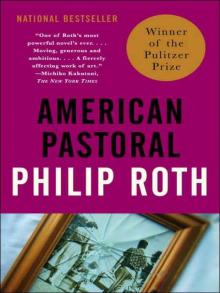 American Pastoral
American Pastoral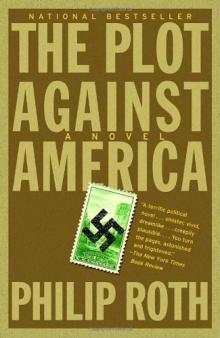 The plot against America
The plot against America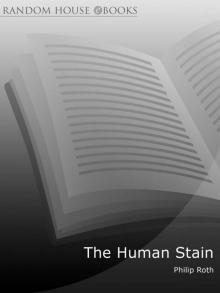 The Human Stain
The Human Stain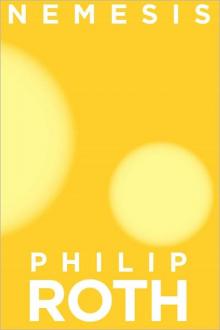 Nemesis n-4
Nemesis n-4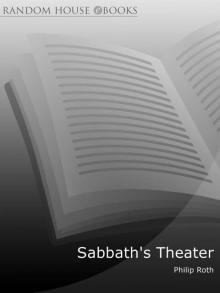 Sabbath’s Theater
Sabbath’s Theater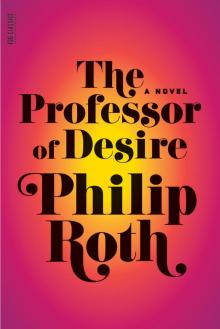 The Professor of Desire
The Professor of Desire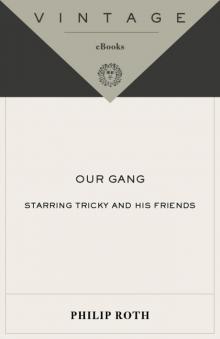 Our Gang
Our Gang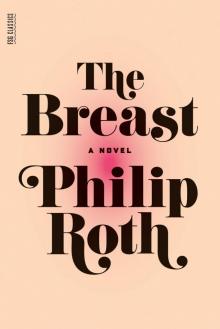 The Breast
The Breast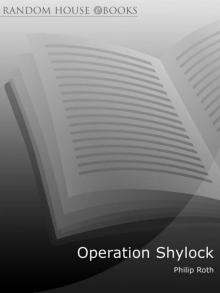 Operation Shylock
Operation Shylock The Dying Animal
The Dying Animal Letting Go
Letting Go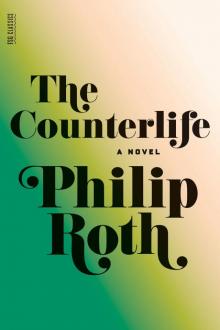 The Counterlife
The Counterlife Everyman
Everyman Nemesis
Nemesis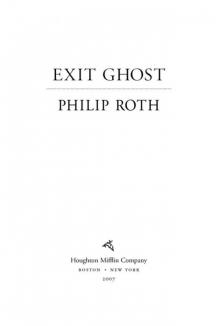 Exit Ghost
Exit Ghost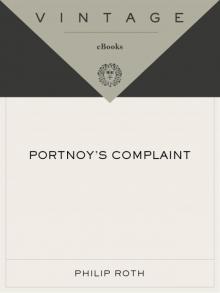 Portnoy's Complaint
Portnoy's Complaint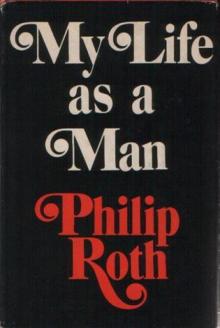 My Life as a Man
My Life as a Man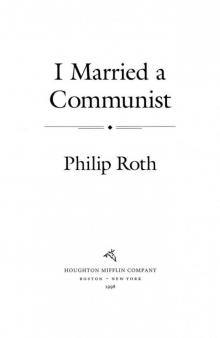 I Married a Communist
I Married a Communist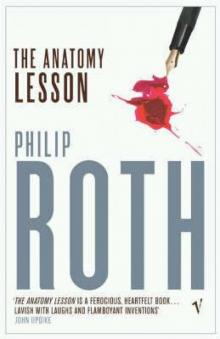 The Anatomy Lesson
The Anatomy Lesson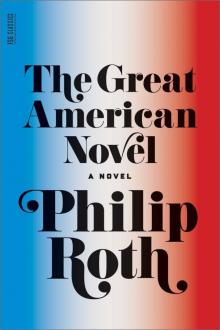 The Great American Novel
The Great American Novel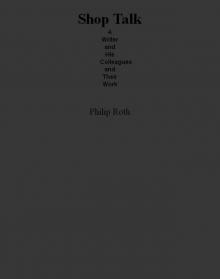 Shop Talk
Shop Talk The Humbling
The Humbling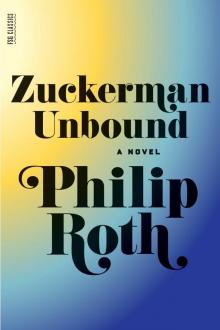 Zuckerman Unbound
Zuckerman Unbound When She Was Good
When She Was Good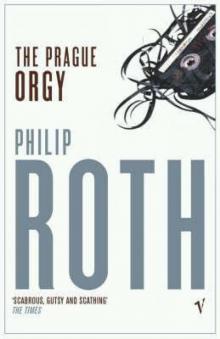 The Prague Orgy
The Prague Orgy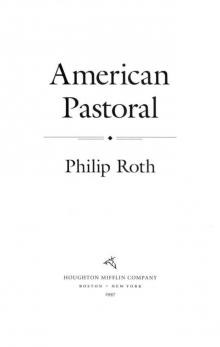 American Pastoral (Nathan Zuckerman)
American Pastoral (Nathan Zuckerman) Goodbye, Columbus
Goodbye, Columbus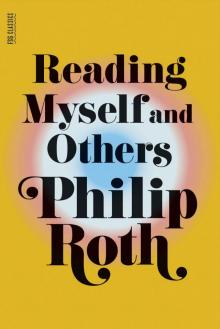 Reading Myself and Others
Reading Myself and Others